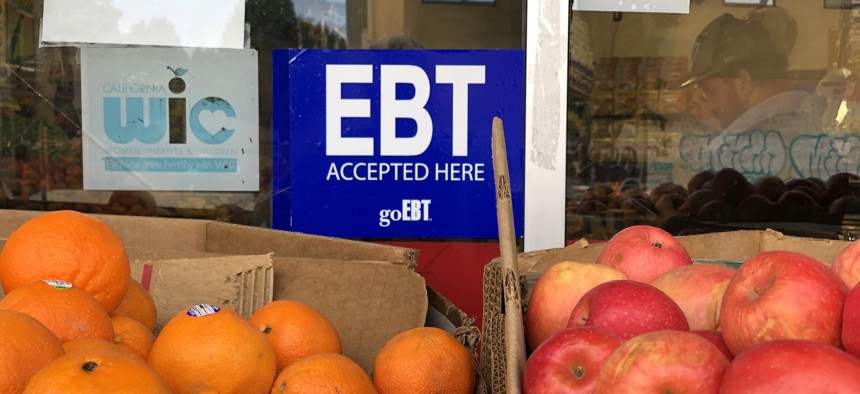What if we had fully funded safety net programs?

Photo by Justin Sullivan/Getty Images
With 100% participation rates in fully funded social services, poverty nationwide would decrease by nearly a third and 4.8 million kids would be lifted out of poverty, according to a new study from the Urban Institute.
Safety-net programs like the Supplemental Nutrition Assistance Program and Temporary Assistance for Needy Families can lift low-income families out of financial distress. But those programs don’t reach all eligible households, in part, because of a lack of funding and low enrollment rates.
But what if the federal government adequately funded all its seven benefits programs and all eligible households received that support? How might a fully funded safety net reduce poverty nationwide? Those are the questions behind the Urban Institute’s new thought experiment.
According to a recent report from the think tank in Washington, D.C., only about half of the people eligible for housing subsidies and programs that supplement food, energy and child care costs receive them. Even families that receive benefits don’t receive the full amount they could.
“At current levels of funding and participation, the amounts that families are eligible to receive but are not currently receiving sum to $266 billion across the seven programs,” the report said. That estimate, however, doesn’t take into account how the benefits affect each other, so that estimate is likely a little higher than it would be in reality. Within that sum, families are cumulatively eligible for but not receiving $118 billion in public and subsidized housing benefits. Under the Special Supplemental Nutrition Program for Women, Infants, and Children less than $3 billion is not distributed to families.
The disparity becomes even more alarming when considering individual programs. Take the Low Income Home Energy Assistance Program, or LIHEAP. At its current funding levels, only about 19% of households that are eligible for the program are enrolled. Even those families receive only about 15% of the total benefits they’re eligible for, according to the Urban Institute.
Fully funding the safety-net programs for all eligible participants would double the dollar amount of benefits distributed nationwide, the report found. With 100% participation rates, poverty in the U.S. would decrease by nearly a third, and child poverty would drop by more than 40%, lifting 4.8 million kids out of poverty.
Some states would see even greater reductions. In Hawaii, for example, poverty would decrease by 46% and child poverty by a whopping 77%.
California, Connecticut, New Hampshire and New York would see the largest reductions in general poverty. Oklahoma, meanwhile, would see the smallest decline (20%).
Adequate funding and full participation would significantly reduce poverty among people of color, the report found. There would be nearly a 40% decline in poverty among Hispanics, and a 35% drop among Black people.
Many of the variations come from differences in costs of living and eligibility standards across states. Current participation levels also affect the share of low-income families that would be lifted out of poverty.
There are several reasons households don’t apply to programs they are eligible for, including a lack of awareness and the stigma associated with public benefits programs. Some families decide the small amount they would receive under a program is not worth going through a complicated application process for.
But the major reason people do not receive all the benefits they qualify for is insufficient federal funding, the report stated. Some families may not receive benefits simply because their locality does not have adequate funding at the time of application.
Still, governments and communities “are looking for ways to promote participation in various programs, to the extent that is feasible within the funding,” the authors wrote, “and many states and localities use their own funding to augment federal funds for certain types of benefits.”
It’s unlikely that these federal programs will be fully funded any time soon. But just increasing participation in current programs could significantly reduce poverty in the short-term, the report stated.






